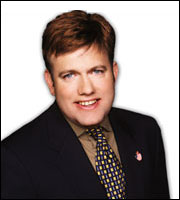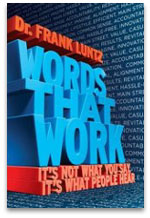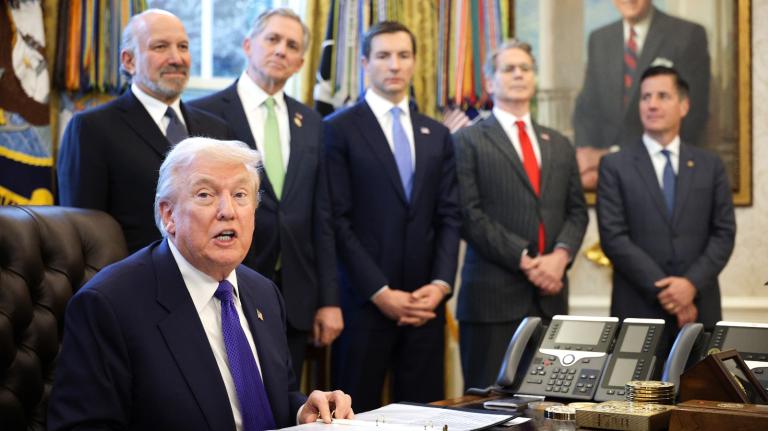Frank Luntz, the famed Republican pollster and messaging consultant who helped to shape Newt Gingrich’s 1994 Contract With America, thinks environmentalists are mean.

Frank Luntz.
The author of a new guidebook on politically effective language, Words That Work: It’s Not What You Say, It’s What People Hear, Luntz is credited with popularizing use of the phrase “death tax” in lieu of “estate tax.” He became notorious in environmental circles in 2003 for a leaked memo [PDF] he wrote telling Republicans how to green their image. He advised them to tout their love of national parks, and to say “conservationist” instead of “environmentalist,” as Luntz believes the latter word reeks of political extremism. He also told Republicans to “make the lack of scientific certainty a primary issue in the debate” over climate change, because “[s]hould the public come to believe that the scientific issues are settled, their views about global warming will change accordingly.”
Luntz has achieved enough notoriety to be lampooned on The Daily Show, where correspondent Samantha Bee described him as having “made a brilliant career of spraying perfume on dog turds.” The National Environmental Trust has doled out Luntzie Awards for the use of politically deceptive language, and created a whole LuntzSpeak website to expose and counter the strategist’s tactics. (Does that count as mean?)
To find out why Luntz thinks enviros have an attitude problem, and how he thinks green messaging could be made smarter, I recently interviewed him while he was speeding in a cab toward the Los Angeles airport.
Q: In 2003, the media got hold of a memo [PDF] you wrote declaring the environment “probably the single issue on which Republicans in general — and President Bush in particular — are most vulnerable.” You’ve since said that the environment played a negligible role in the 2004 and 2006 elections. Why did this huge vulnerability fail to play a central role in the elections?
A: Because the environmental community hasn’t figured out how to communicate effectively.
Q. What do you mean?

Words That Work, by Frank Luntz.
A. People think environmentalists tend toward the extreme position — they’re considered uncompromising, unyielding, very political. I get yelled at by them all the time, and yet they keep losing and losing when they should be more successful.
The American people believe in clean air and clean water. The American people believe in open spaces. I know this, I’ve polled it. What they don’t believe is the idea that you would close everything down, put it under lock and key. They believe that you can use the environment while still protecting and appreciating it, and the environmental community just doesn’t understand that. It’s why the word environmentalist, people don’t like it anymore.
But you understand, I’m not in the business of trying to explain this to them. In my dealings with them, they’re mean. Some of the most personally nasty people come out of the environmental community.
Q. Why do you think that is?
A. I think that they believe so strongly in their point of view, and they believe that anyone who doesn’t share what they share or believe what they believe is not only wrong but evil.
Q. It sounds like you see it as a dogma almost, as religious zealotry.
A. I don’t see environmentalism that way, I see environmentalists that way. I think it’s like they’ve taken a very important issue and they’ve undermined their own case for it.
The problem the environmental community has is they don’t listen to their opponents. When I do my research, I spend more time studying the opposition argument because that’s what I need to respond to. The environmental community never listens. If they listened, they would have realized very early on that they would find common ground with other allies.
Q. Can you give an example?
A. In trying to achieve protection of endangered species, they created the land-rights movement. It did not exist before. But because they were unbending — not just in the rules and regulations, but even in the enforcement and how it’s done — a whole bunch of Western ranchers rose up, organized, and may now have tipped the balance too far against endangered species. The public wants a balance, and any time it goes too far in one direction, the public says no.
Q. Some polls show that the environment played big in a few key 2006 races, like Arnold Schwarzenegger’s, and Rep. Richard Pombo in California, and Sen. Conrad Burns in Montana. Do you think those were cases where environmentalists are getting more savvy about appealing to the mainstream?
A. No, that’s not accurate. No. Anyone who knows those races knows that that’s not accurate. Conrad Burns lost because of Jack Abramoff. Arnold Schwarzenegger [won on] a whole series of issues — environment is just one tiny one [on which] Arnold took a different approach. Pombo faced the most incredible unification of people who disagreed with him coming together financially and cooperatively, and it was an onslaught in a state that has really turned against the GOP with the exception of Schwarzenegger.
Q. So you still believe the environment hasn’t become a front-burner issue in any political races?
A. No, [it hasn’t]. And it’s amazing because you ask people, do you care about the environment? And their answer is, almost universally, yes. And then you wonder, why doesn’t it play a bigger role?
I’ve come to the conclusion that the environmental community exists to raise money. They exist to raise money so they can spend money, and so it doesn’t behoove them to claim victory. It behooves them to perpetuate a sense of alarm.
Q. Do you believe that climate change is real and happening?
A. I believe that it is, uh … I have no solution to it right now.
Q. But is it real and happening?
A. Yes, I believe that it is an issue.
Q. Let’s say that you have a client whose concern was to make global warming a front-burner issue in 2008 — how would you advise a plan of action? Let’s say three directives.
A. I’m not going to do that.
Q. Why? Because you expect a fee for such advice?
A. There are very few people that I don’t meet with, because [with most people] I will learn from them and I think they want to meet with me to learn from me. These [environmentalists] are people who are just mean.
Q. I’m not saying the client has to be an environmentalist. The environment is a bipartisan issue. Let’s say John McCain were asking you to advise a plan of action.
A. The No. 3 point is the polar bears — they’re this generation’s spotted owl. They’re the previous generation’s bald eagle. Another animal that people can see, one that they have a soft side for, and the animal, the species, is under threat.
No. 2 is what Al Gore did, when you show people, when it’s visual, when they can see it. Basically what his movie is, it’s 30 different vignettes of exactly the same thing said in a very different way. And each one lasts about three minutes long, and you see sometimes it’s America-based, sometimes it’s international, sometimes it’s maps, sometimes it’s live footage, but it’s the same story that people can see. They gotta see it, not just hear it or read about it.
And then the No. 1 thing is to have a plan for a solution that is embracing rather than divisive. It’s not enough to complain and rant. The No. 1 thing is to have a solution for the problems that they identify.
Q. Green groups have been putting a lot of emphasis lately on renewable-energy development, which ostensibly offers win-win-win solutions to economic, national-security, and environmental concerns. Is that an example of the kind of message that’s embracing and not divisive?
A. Yeah, I think energy independence is the best issue, the best language for the future.
Q. You’ve said that the failure of messaging is a result of leaders who use extreme language. Who do you see as a leader who could appeal to the mainstream with a kinder, gentler environmental voice? Schwarzenegger?
A. Schwarzenegger could do it. John McCain could do it. The most effective voice would be a convert, someone you least expect to speak out.
Q. What about Al Gore? He’s a man who was once seen as an extreme liberal and whose environmental message ironically is bringing him more and more mainstream appeal.
A. His movie was so persuasive that people looked at him and changed their outlook. He does not have the same image today that he had when he was vice president. It’s interesting that Al Gore has become cool. He shows up on the MTV Awards and gets a standing ovation from the kids. Six years ago they wouldn’t have even listened to him.
Q. So what happened?
A. He found a way to present a scientific issue in a popular way and to humanize something that until that point was just numerical. He made emotionally intimate something that had just been an abstract idea.
Q. In your book, you say efficiency is one of the most effective words in the environmental realm or politics in general. And you’ve also advocated conservationist over environmentalist. What are some other words that you see as particularly strategic?
A. Energy independence. Energy self-sufficiency. Energy security. Energy diversity.
Q. So these are words that connect the environment to other issues?
A. Correct. I think in fact that the whole issue of environment would be much better sold, much better communicated, if it were done from an energy standpoint than from an environmental standpoint.
Q. The GOP has triumphed over Democrats in the messaging arena in recent years, but now the party seems to be on the skids. Does this suggest that their messaging strategy is losing effectiveness?
A. Democrats didn’t get better at messaging during the election because all they did is criticize Republicans. I don’t think it was a failure of Republican messaging; I thought it was a failure of Republican policy and Republican administration of that policy. The American people were angry about wasteful Washington spending. They were angry about the immigration problem. They were angry about corruption in Washington. And the way they expressed that anger was voting out the people in power. The public said they’d had enough already of A, now we’ll see what party B will do.
Q. How does environment play in your own life?
A. Well, that’s a great question. I expect people to be consistent in what they think and how they behave, and it annoys me that people will have green stickers on their SUVs.
What I do at home is I turn off every light. I keep the temperature set at a reasonable level — in the summertime the house will cool to 74, and in the wintertime the house will heat to 69. I drive an Acura, but I’m on the road all the time so I’m rarely in my car.
But I’ll be honest with you: I love private planes, even though I know that they’re the worst.


